It’s a little after 5pm as I drive into the Supersport studios. The sky is overcast – it’s been threatening to rain all afternoon. Downstairs, in the windowless dungeon we call the makeup room, I find Claire Mawisa. Her makeup, as usual, is absolutely flawless. Her newly-dyed auburn dreadlocks are in a ponytail and the red dress she’s chosen for tonight’s broadcast is a showstopper. I’m pretty sure she’s chosen tonight’s look herself, because when it comes to her public image, everything Claire does is intentional.
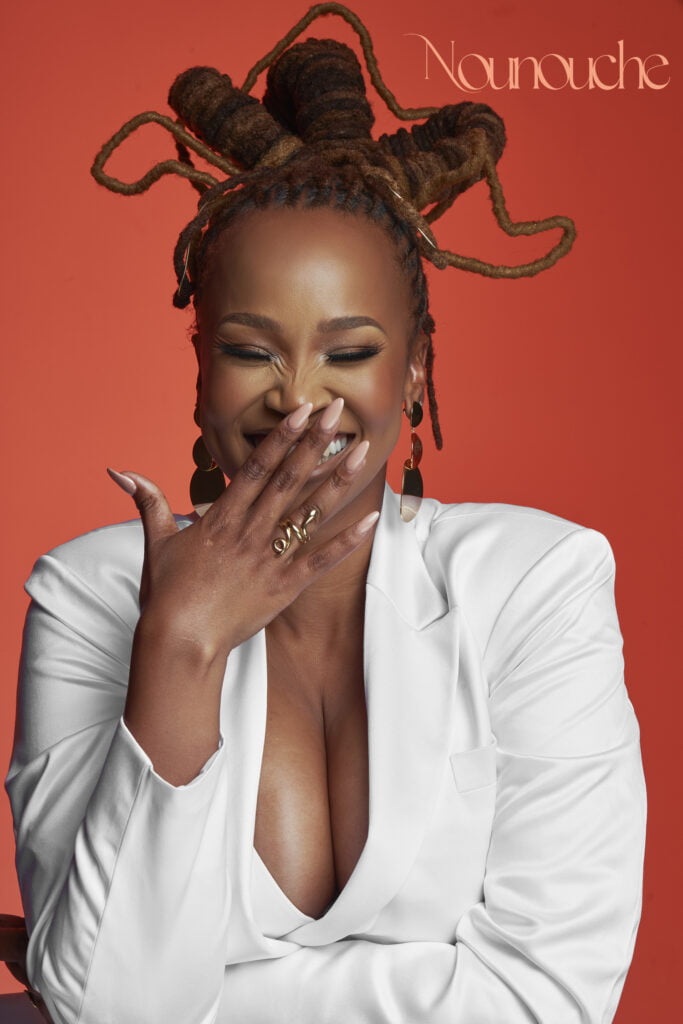
Over the last few months, we’ve shared many laughs in this makeup room, but today is a little different. It’s been just a few hours since my interview with Claire this morning, and when we last spoke, over Teams, she was fresh-faced, relaxed, and wrapped in a cosy white gown. I’ve worked with Claire for over seven years, but I’ve never interviewed her before and in fact, I know how much she dislikes being interviewed.
“Every interview is the same,” she says. “They all ask me the same old, tired questions.”
By the time I get to work, she’s all dressed up and ready to go live on MNet’s top current affairs program, Carte Blanche, with legendary broadcast veteran Derek Watts. The two of them anchor the show together every second week. It’s a relatively new partnership, but the natural chemistry between them is already taking shape.
Moments before 7pm, the studio director starts his countdown, “three, two, one… cue Claire.” She launches smoothly into the script: “Molweni, I’m Claire Mawisa and this is your Sunday night edition of Carte Blanche.”
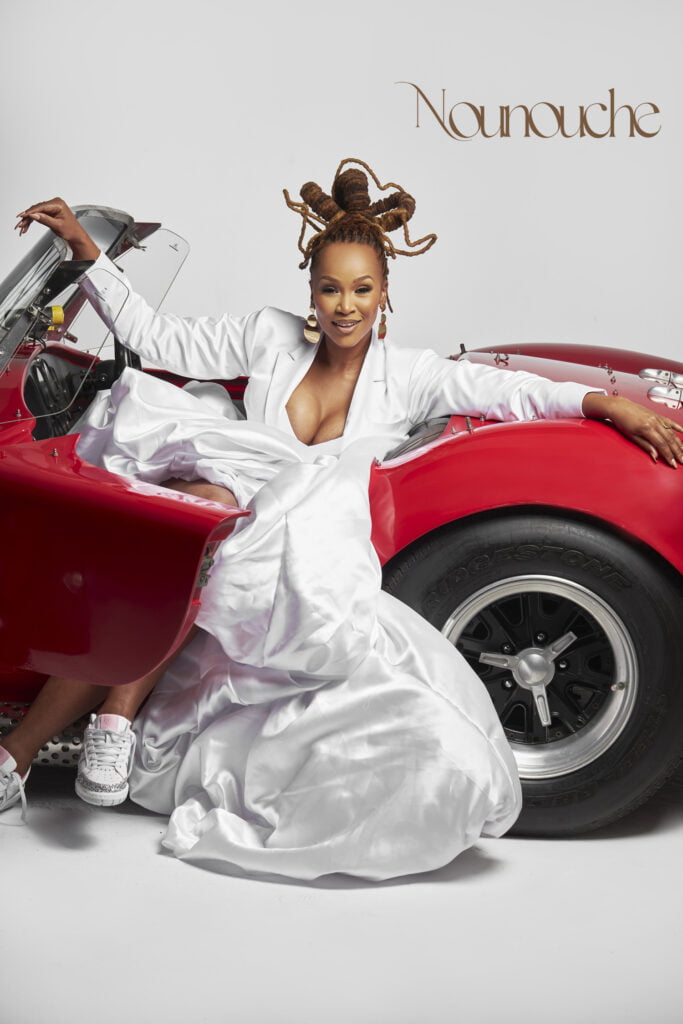
This is Claire in her fullness: bold, confident, and empowered. It’s a story that’s been decades in the making…
As we settle into our conversation, it strikes me that the Claire sitting chatting to me today has evolved from the woman I first met all those years ago at the Carte Blanche offices. She still has the same vibrant personality and infectious laugh, but I get the sense that time and experience have sharpened her senses. She describes it as the power of ageing.
“The beauty about ageing is that you are clear on what you like. So even in sex and sexuality, the awareness is there. The turbulent twenties are over and you are almost in a higher level of vibrating and it’s an empowering feeling when you feel strong and beautiful in your body, at this age.
You can be physically beautiful and attractive all your life, but if you are not aware of what you like, what attracts you, what is unattractive to you, if you don’t know how to wield that power, if you don’t know how to walk into a room and be fully present in that, it’s kind of wasted.”
She quickly adds that aging is one of the greatest gifts for women because in many ways, it’s an opportunity to unlearn “a lot of nonsense, about men and control and power and sexuality and you, loving sex and wanting it, all those things, like we always think it’s a man’s domain and we kind of surrender to that idea.”
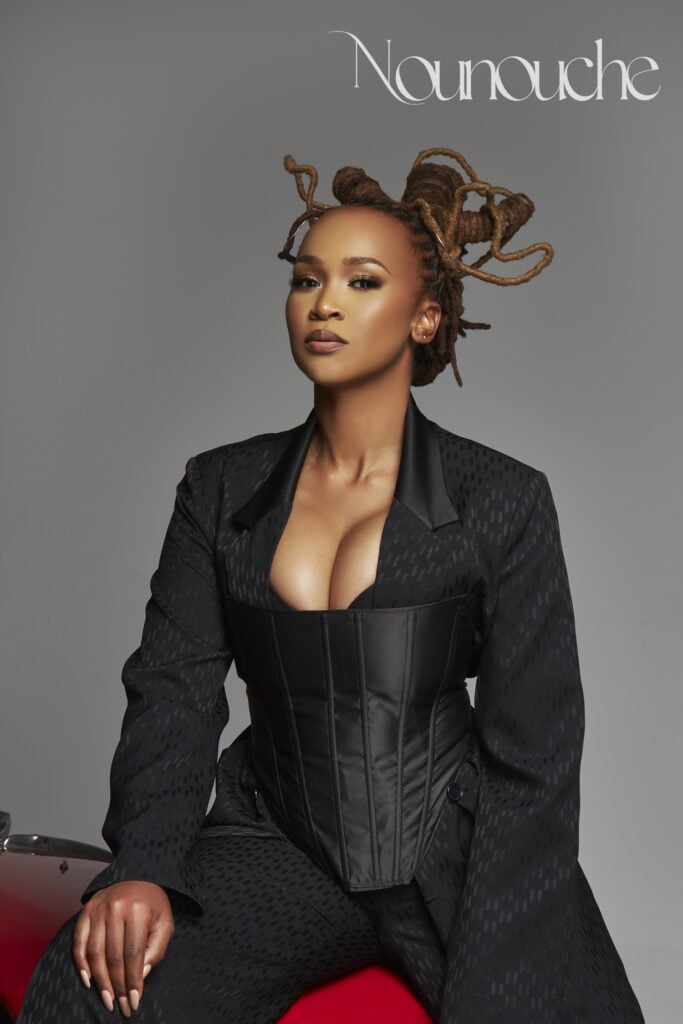
As I watch Claire become more animated in her responses, I realise that this isn’t a conversation that we’ve ever had before and for someone who often describes herself as conservative, I’m surprised by how candid she quickly becomes.
“I haven’t been in a relationship for over two years, since before the pandemic. And the longer I’m not with someone, the more difficult it’s going to be for me to be with someone because I’m clear on what I want and I’m clear on my value and on my work… I now know how high my standards are.”
Despite feeling empowered by her single status, Claire says that she has had to come to terms with its pressures: the implication that singleness means inadequacy, a failure to live life to its fullest.
“I’m not going to say that I haven’t felt that at some point in my life that, ‘Oh, my God, I’m alone. Is this like the black mark on me?’ But I’m finding more and more women are – and I’m one of them – at a point where if it doesn’t meet what I want, I’d rather walk away.”
Claire admits that she wasn’t always so clear about what she wanted out of relationships and that for many years, she found herself repeating the same destructive patterns. She credits therapy with helping her understand the source of her pain.
“It was very normal – and it is very normal – to not have your father in the home. In my lived experience with my friends, that was a normal thing and I thought that it didn’t really affect me. I thought my mother was amazing but when I was a younger woman, I was extremely resentful that my father wasn’t there.”
She says her father’s departure from her childhood was something she had subconsciously internalised.
“Him leaving, and not choosing me, made me feel like, ‘nobody else has a reason to stay if not even my father chose to stay.’ So even if somebody was actively choosing me, I would then sabotage that relationship and push them away because that was the narrative that I understood.”
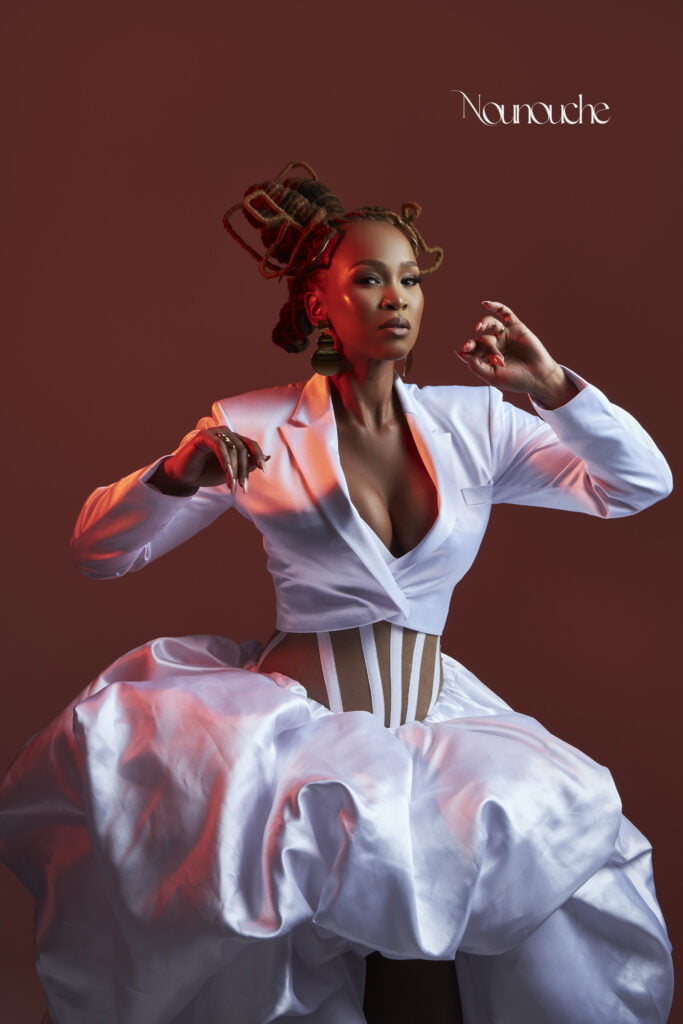
Claire has been in therapy, on and off, since her twenties, and it’s something she encourages many people to do. As she puts it, “once you are in your first therapy session, there’s no going back in a quest of trying to understand yourself.”
As we talk about how hard Claire has worked to protect her own inner peace, I’m reminded that she’s also had to learn to create what she calls “safe spaces” for the people she interviews as a presenter on Carte Blanche.
“What we do is a massive responsibility” she says thoughtfully.
I know that there have been times past counting when she’s reached out across a table to comfort a stranger, or held someone in her arms after the cameras have stopped rolling, as they finally allow themselves to feel their pain.
But I now wonder how those experiences affect her. I remember one difficult assignment from earlier this year, in which Claire covered the brutal rape and murder of Hillary Gardee. During filming, the crew retraced Hillary’s final journey to the veld where she died.
“You know, we didn’t know what we were going to do. The microphone was on me. We got out of the car and I cried. I cried and I cried. And I was okay to cry because it was appropriate. It was real.”
She describes how, in that moment, she tried to put herself in Hillary’s shoes.
“I thought to myself, I would hate to wake up here alone during the day – let alone after being beaten, raped and shot.”
It’s a moment to pause and contemplate the dark shadow that hangs over the country. It’s not safe to be a woman in South Africa, but Claire insists that women need to know when to stop consuming bad news.
“We are being hunted and slaughtered. We are being pulled apart, literally: our limbs are being chopped up and they are ending up in people’s fridges,” she says. “You must be able to shut it out because it’s disturbing your peace as a woman.”
Peace, it’s a theme that’s come up a few times during our conversation and it’s quite clearly something she holds dear. But recently, there was one big occasion that I know absolutely disturbed her peace.

In August this year, Claire was invited to join the extraordinary league of Tedx talks speakers. It’s an opportunity that she says she had to talk herself into taking.
“When they said, do you want to, I said ‘no’. I can’t do it. And then I realised that this is the growth. This is an opportunity, it feels a bit bigger but it’s not too big for me.”
Despite her fears and insecurities, it’s one of her proudest moments, she says. A moment where she pushed through her own self-doubt.
Her talk is titled “Unknowingly manifesting my destiny” and it’s a charming and often funny “talk” about Claire’s own “small beginnings”.
It’s a journey that began when she was just eight years old with a big dream to one day host the Miss South Africa pageant. More than thirty years since that “talkative, bossy” little girl owned the playground, Claire has mastered how to play the long game in a cut-throat media industry that’s notorious for aging out the talent.
But she has one parting shot.
“Don’t discount where you are right now, even if it is not exactly where you want to be. Putting your best foot forward, here in this moment, propels you into places that you could never have dreamed, even for yourself.”
And just like that, our conversation comes to an end. It seems both of us still have a show to prepare for tonight.
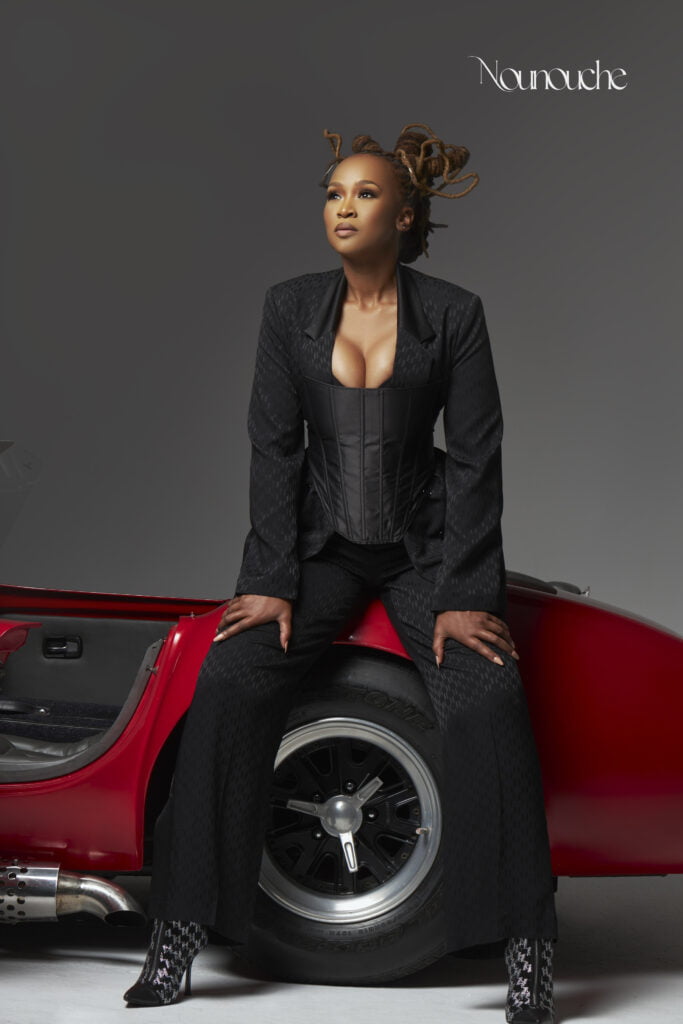
Cover story: Chwayitisa Futshane
Editor-in-Chief: Bonnie Meslane
Photographer: Katlego Mokubyane
Creative Director: Lesego Kgosimolao
Producer: Bonnie Meslane
Stylist: Advice by Kgosilesego
Makeup: Nono Linchwe
Hair: Bomzi Lekgoro
Production Assistants: Nomvelo Masango & Uzzi Magenu
Head of Digital: Sekelwa Mpambo
Wardrobe Assistants: Michael Dlamini & Nthabiseng Ntshabele
Videography: Michael Dlamini
Graphic Designer: Adekunle Owolabi
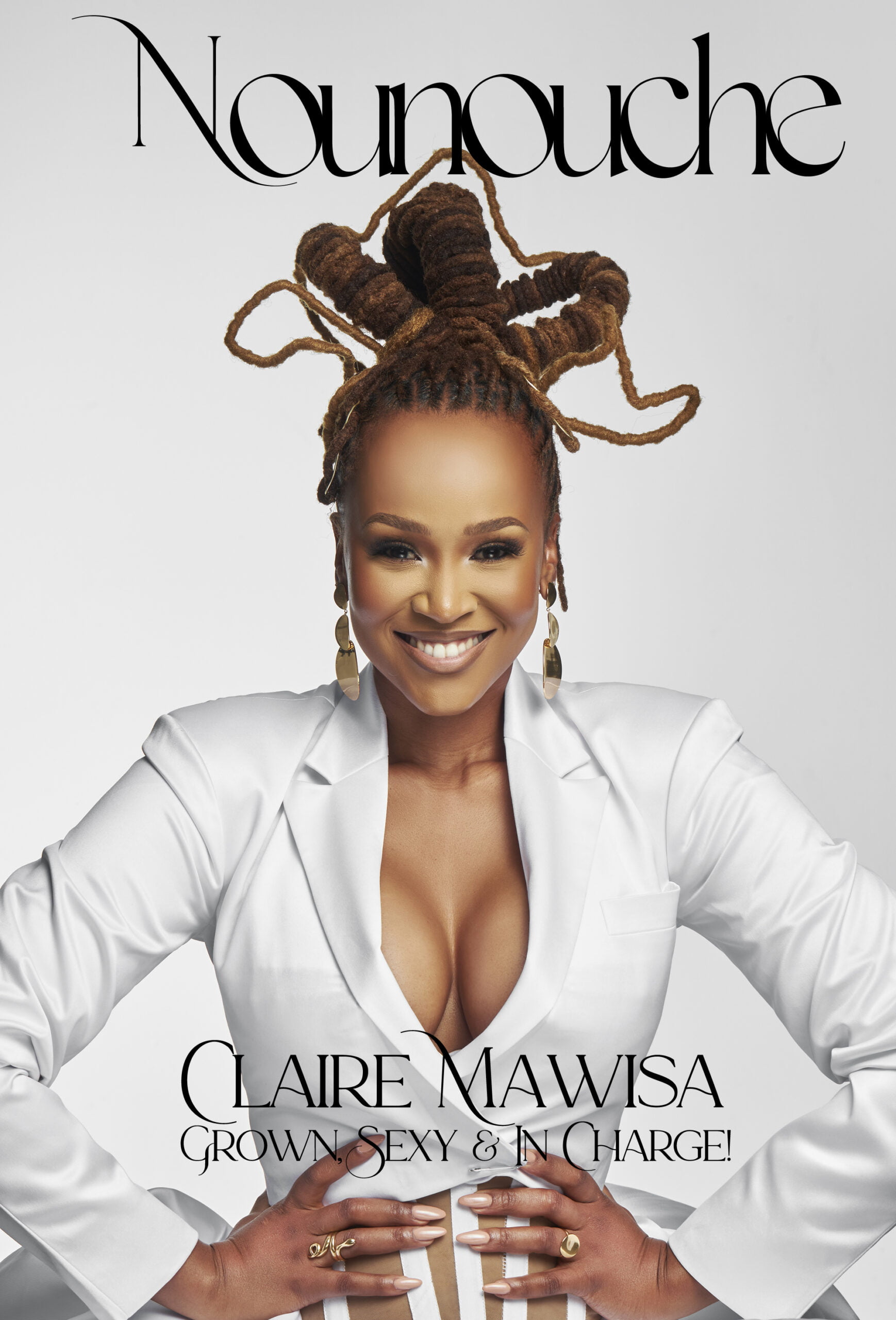
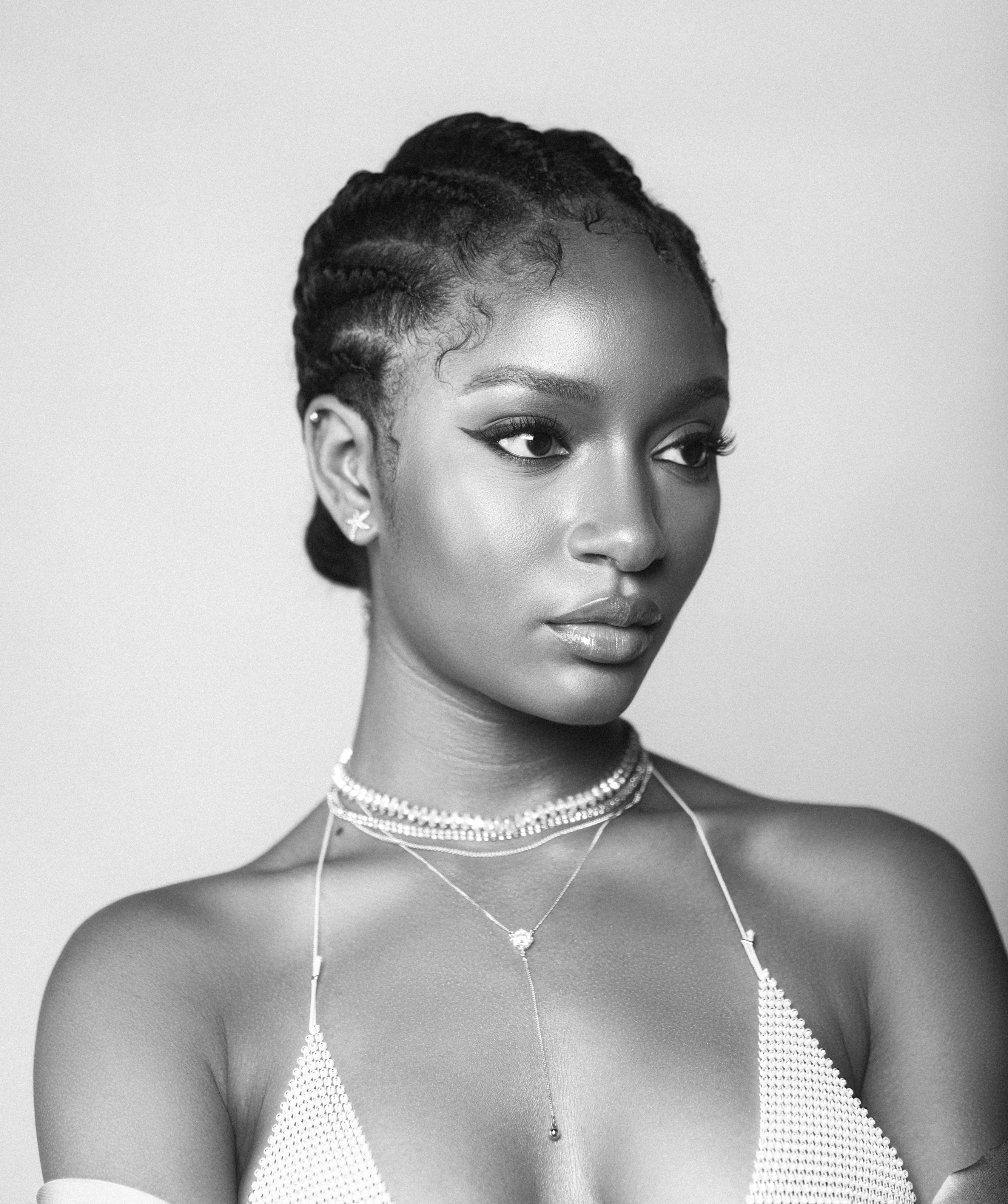
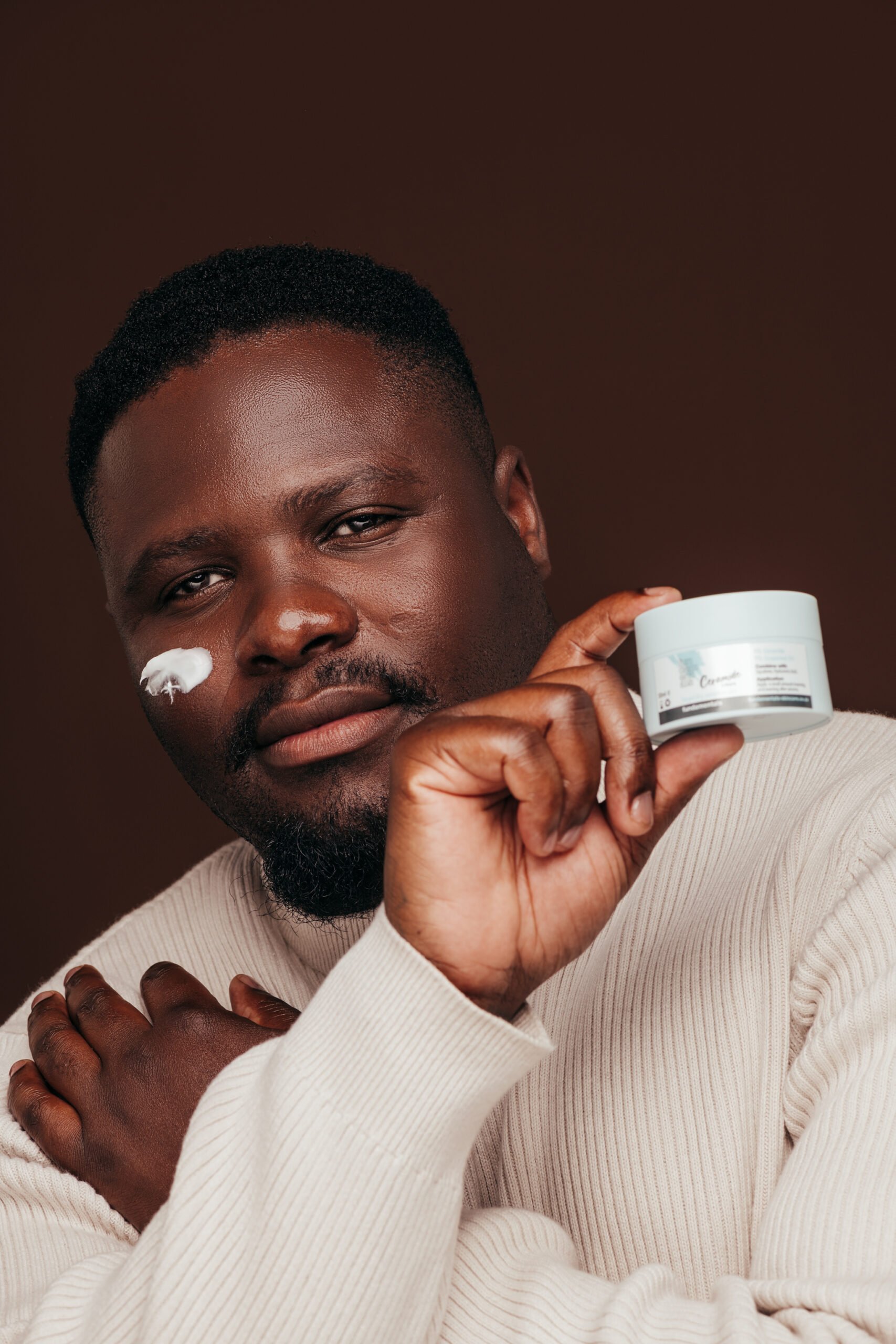
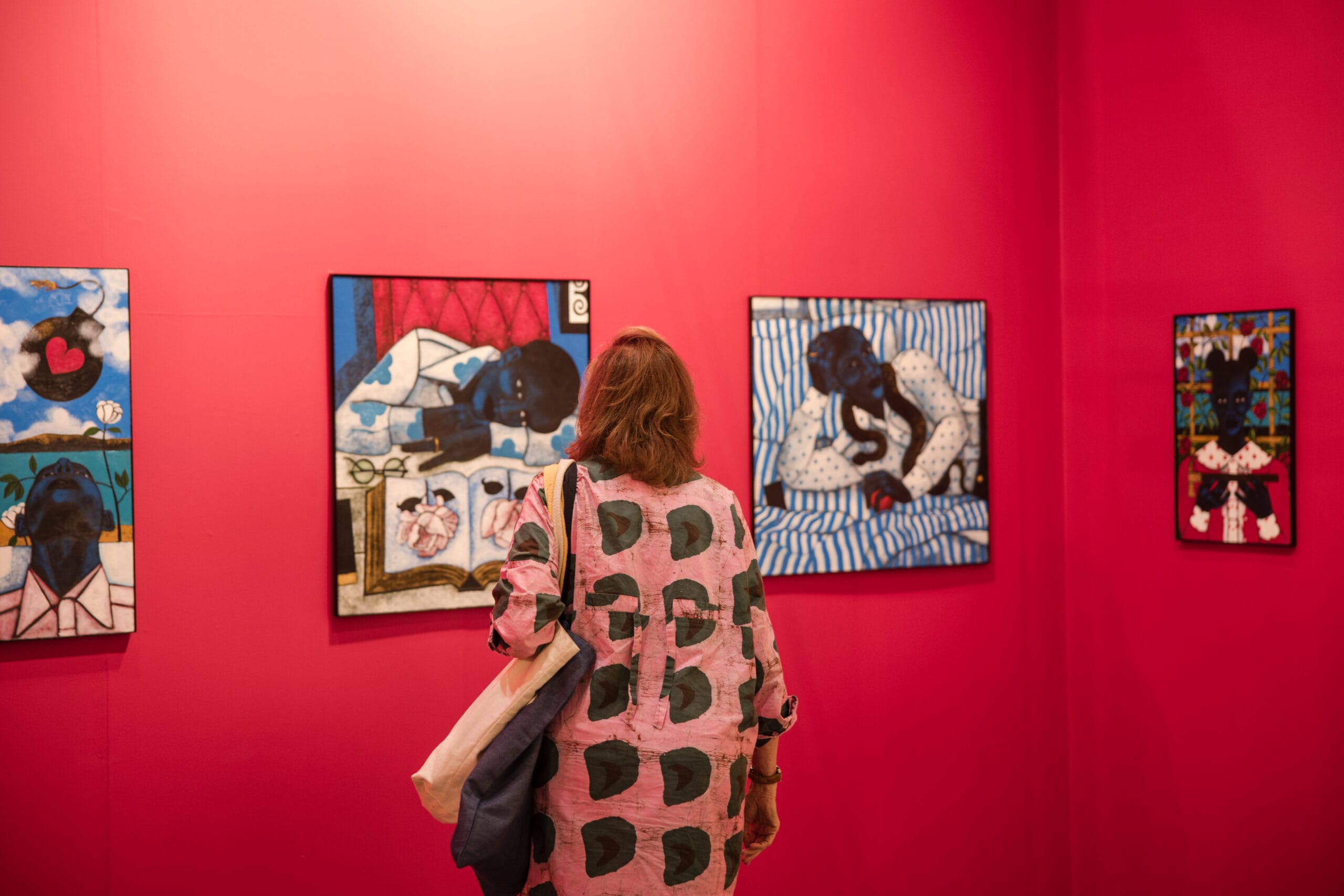
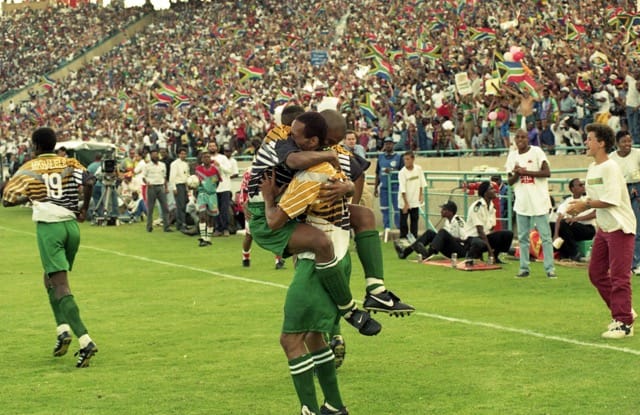

ks quik 2000
… [Trackback]
[…] Here you will find 61685 more Info to that Topic: nounouche.online/claire-mawisa-grown-sexy-and-in-charge/ […]
พรมรถ
… [Trackback]
[…] Find More Info here to that Topic: nounouche.online/claire-mawisa-grown-sexy-and-in-charge/ […]
naga356
… [Trackback]
[…] Information on that Topic: nounouche.online/claire-mawisa-grown-sexy-and-in-charge/ […]
คิดเลขเร็ว
… [Trackback]
[…] Here you can find 57477 additional Information on that Topic: nounouche.online/claire-mawisa-grown-sexy-and-in-charge/ […]
บ้านมือสอง
… [Trackback]
[…] Read More on that Topic: nounouche.online/claire-mawisa-grown-sexy-and-in-charge/ […]
website bovenaan in Google
… [Trackback]
[…] Find More Info here on that Topic: nounouche.online/claire-mawisa-grown-sexy-and-in-charge/ […]
จ่ายจริง
… [Trackback]
[…] There you can find 45212 more Information on that Topic: nounouche.online/claire-mawisa-grown-sexy-and-in-charge/ […]
สล็อตเว็บตรง
… [Trackback]
[…] Info to that Topic: nounouche.online/claire-mawisa-grown-sexy-and-in-charge/ […]
Browning shotguns
… [Trackback]
[…] Find More to that Topic: nounouche.online/claire-mawisa-grown-sexy-and-in-charge/ […]
drag bar
… [Trackback]
[…] Here you can find 85212 more Information to that Topic: nounouche.online/claire-mawisa-grown-sexy-and-in-charge/ […]
rainbow six siege cheat engine table
… [Trackback]
[…] Info to that Topic: nounouche.online/claire-mawisa-grown-sexy-and-in-charge/ […]
Sarah
… [Trackback]
[…] Here you will find 33175 additional Info on that Topic: nounouche.online/claire-mawisa-grown-sexy-and-in-charge/ […]
รับจัดงานอีเว้นท์
… [Trackback]
[…] Read More Information here on that Topic: nounouche.online/claire-mawisa-grown-sexy-and-in-charge/ […]
หวยธกส เพื่อคนไทย แทงได้ไม่อั้นบนเว็บ LSM99
… [Trackback]
[…] Read More Info here to that Topic: nounouche.online/claire-mawisa-grown-sexy-and-in-charge/ […]
ufa168
… [Trackback]
[…] Find More Info here to that Topic: nounouche.online/claire-mawisa-grown-sexy-and-in-charge/ […]
เคล็ดลับ แทงไพ่เสือมังกร
… [Trackback]
[…] Info to that Topic: nounouche.online/claire-mawisa-grown-sexy-and-in-charge/ […]
Happyluke
… [Trackback]
[…] Read More to that Topic: nounouche.online/claire-mawisa-grown-sexy-and-in-charge/ […]
https://www.songfactory.nl/2025/03/02/pocket-option-kyc-a-comprehensive-guide-to-secure/
… [Trackback]
[…] Here you can find 46134 more Information on that Topic: nounouche.online/claire-mawisa-grown-sexy-and-in-charge/ […]
aviator website
… [Trackback]
[…] Find More here on that Topic: nounouche.online/claire-mawisa-grown-sexy-and-in-charge/ […]
Ruth
… [Trackback]
[…] Find More on that Topic: nounouche.online/claire-mawisa-grown-sexy-and-in-charge/ […]
อัพเกรดไฟหน้ารถยนต์
… [Trackback]
[…] Info to that Topic: nounouche.online/claire-mawisa-grown-sexy-and-in-charge/ […]
casino
… [Trackback]
[…] Here you can find 46148 additional Information to that Topic: nounouche.online/claire-mawisa-grown-sexy-and-in-charge/ […]
รับติดตั้งระบบระบายอากาศ
… [Trackback]
[…] There you will find 67277 additional Info on that Topic: nounouche.online/claire-mawisa-grown-sexy-and-in-charge/ […]
1win
… [Trackback]
[…] There you can find 79501 additional Info on that Topic: nounouche.online/claire-mawisa-grown-sexy-and-in-charge/ […]
1ufabet
… [Trackback]
[…] Read More on on that Topic: nounouche.online/claire-mawisa-grown-sexy-and-in-charge/ […]
1xbet chile
… [Trackback]
[…] Info to that Topic: nounouche.online/claire-mawisa-grown-sexy-and-in-charge/ […]
1win
… [Trackback]
[…] Read More Information here on that Topic: nounouche.online/claire-mawisa-grown-sexy-and-in-charge/ […]
สั่งสินค้าจากจีน
… [Trackback]
[…] Find More Info here to that Topic: nounouche.online/claire-mawisa-grown-sexy-and-in-charge/ […]
ปลูกผม
… [Trackback]
[…] Read More Information here on that Topic: nounouche.online/claire-mawisa-grown-sexy-and-in-charge/ […]
7slots
… [Trackback]
[…] Information on that Topic: nounouche.online/claire-mawisa-grown-sexy-and-in-charge/ […]
โคมไฟ
… [Trackback]
[…] Find More on on that Topic: nounouche.online/claire-mawisa-grown-sexy-and-in-charge/ […]
Ethical Elephant Sanctuary
… [Trackback]
[…] Find More here to that Topic: nounouche.online/claire-mawisa-grown-sexy-and-in-charge/ […]
างค่าย Blueprint Gaming SLOT
… [Trackback]
[…] There you will find 29212 additional Info to that Topic: nounouche.online/claire-mawisa-grown-sexy-and-in-charge/ […]
ขายเหล็ก
… [Trackback]
[…] Find More on on that Topic: nounouche.online/claire-mawisa-grown-sexy-and-in-charge/ […]
Cheetah X
… [Trackback]
[…] Read More here to that Topic: nounouche.online/claire-mawisa-grown-sexy-and-in-charge/ […]
Go X rentals
… [Trackback]
[…] Read More on that Topic: nounouche.online/claire-mawisa-grown-sexy-and-in-charge/ […]
แบคดรอปผ้า
… [Trackback]
[…] Read More to that Topic: nounouche.online/claire-mawisa-grown-sexy-and-in-charge/ […]
พรมรถยนต์
… [Trackback]
[…] Find More Information here to that Topic: nounouche.online/claire-mawisa-grown-sexy-and-in-charge/ […]
เนอร์สซิ่งโฮมต่างจากบ้านพักคนชราอย่างไร
… [Trackback]
[…] Find More Info here to that Topic: nounouche.online/claire-mawisa-grown-sexy-and-in-charge/ […]
ร้านขายเครื่องมือช่าง
… [Trackback]
[…] Find More to that Topic: nounouche.online/claire-mawisa-grown-sexy-and-in-charge/ […]
https://slotikakazinovoyti.narcogol.kz/home/
… [Trackback]
[…] There you will find 43586 additional Info on that Topic: nounouche.online/claire-mawisa-grown-sexy-and-in-charge/ […]
ชิปปิ้งสุวรรณภูมิ
… [Trackback]
[…] Find More here on that Topic: nounouche.online/claire-mawisa-grown-sexy-and-in-charge/ […]
HL789
… [Trackback]
[…] Find More on that Topic: nounouche.online/claire-mawisa-grown-sexy-and-in-charge/ […]
vaksin umrah johor bahru
… [Trackback]
[…] Find More on to that Topic: nounouche.online/claire-mawisa-grown-sexy-and-in-charge/ […]
казино рулетка онлайн на деньги на kazinoruletkaonlaynnadengi.kz
… [Trackback]
[…] Find More on on that Topic: nounouche.online/claire-mawisa-grown-sexy-and-in-charge/ […]
ชุดเครื่องเสียง
… [Trackback]
[…] Find More on that Topic: nounouche.online/claire-mawisa-grown-sexy-and-in-charge/ […]
โรงแรมหัวหิน
… [Trackback]
[…] Here you can find 36355 more Information on that Topic: nounouche.online/claire-mawisa-grown-sexy-and-in-charge/ […]